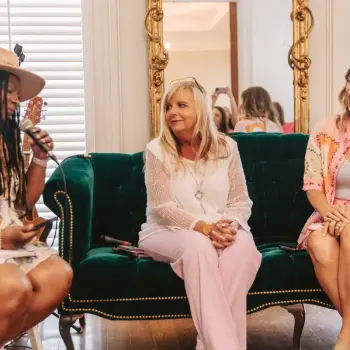Now Featured in the Patheos Book Club
Push Back the Dark:
Companioning Adult Survivors of Child Sexual Abuse
By Elizabeth M. Altmaier
What is my own trauma story?
My parents are longtime members of your congregation. Their attendance at morning and evening services each Sunday can be expected, and they will also be at every prayer meeting and special service. Their marriage is a role model for younger couples, and often you hear my mother or father talk about the power of Christian marriage. My father is a business man, and he volunteers his expertise for church tasks. He is looked up to by other men, and serves regular terms as an elder. My mother is active in women's ministry: she has women over to our home for coffee, and you are thankful for her work when you hear struggling women talk about her inspirational leadership.
I am a child in your congregation. I am the youngest child in my family and the only girl. When I am in grade school, I am "just the cutest thing." My long hair is in pigtails or a pony tail, my dresses are adorable, and I have a bubbly personality. I have memorized more Bible verses than any other child my age, and I wear my Sunday School attendance award each week with pride. I go to a Christian camp each summer. As I get older, I volunteer in the church nursery. I announce that I want to be a teacher when I am grown up, just like my mother was before she married.
I am a teenager in your congregation. It is rumored that I drink alcohol, use drugs, have sex, and run with the "fast crowd" at school. The high school boys in the church's teen group are alternately attracted to and repelled by me, and they exchange glances and smirk in my presence. My behavior shames my parents, and you can't decide if you should "say anything" to them or not. My parents, however, carry on as if nothing is wrong, so you decide against making things more difficult. They are still somewhat in control of me, you think, since I am in Sunday School and church each week. Perhaps it's just a phase, you tell yourself. You are relieved when you hear I will attend a prestigious Christian college where you are sure I will get my life back on track.
I am a student at a prestigious Christian college. Since my attendance at daily chapel is forced, I listen to hundreds of sermons over a four year period, participate in numerous Bible studies, and even come forward to testify during a revival. But other behaviors contradict that appearance: in opposition to the college's code of behavior, my hidden life revolves around substance abuse and illicit relationships. I am adept at living "under the radar" of behavioral expectations. Unexpectedly, I find comfort and a sense of belonging in my psychology major and my professors, and begin to embrace a dedicated student role. But the darkness of my life continues.
I am that little girl with the storybook upbringing. And I am an incest survivor, a victim of childhood sexual abuse. The perpetrator was my father. The abuse began when I was a preschool child, and continued into my elementary school years. That "out of control" teenager started drinking, using drugs, and having sexual relationships as a twelve year old. My teen years were desperate, dark with confusion, depression, and anger. That prestigious Christian college I attended? My parents forced me to go there, but my behavior continued unabated. In fact, it was in that Christian environment that I learned how to live on two levels. As an adult, my life continued on two parallel tracks. The outer woman was adjusted, competent, and high functioning who combined her career with marriage and two children. The inner woman used substances excessively; had an array of psychiatric disorders including eating disorders, depression, compulsions, and panic episodes; and dealt with life through hyper-vigilance, workaholism, and obsessions about control.
What are the consequences of childhood sexual abuse to the developing child?
The process of healthy development in infancy and childhood provides an outlook from which to understand the consequences of childhood sexual abuse. Children are not just smaller versions of adults. Rather, they are unique developing beings faced with essential tasks in physical, cognitive and emotional development that are the necessary foundation for later abilities as adults. We are familiar with milestones: when infants sleep through the night, begin cooing, or play peek-a-boo. Occasions such as taking a first step or waving "goodbye" are important steps reassuring parents of the healthy physical growth of their children. There are parallel psychological developmental milestones as well.
What is trust?
In infancy, children develop trust, the first milestone. Children's understanding of the world is formed by their interactions with parents. Children who feel warmth and experience consistency having their physical and emotional needs met develop trust in others and a sense of their own worth. When children do not have their needs met in an ongoing way, or are neglected, or mistreated, they cannot form that trusting relationship. If that happens, the entire foundation of development is harmed.




